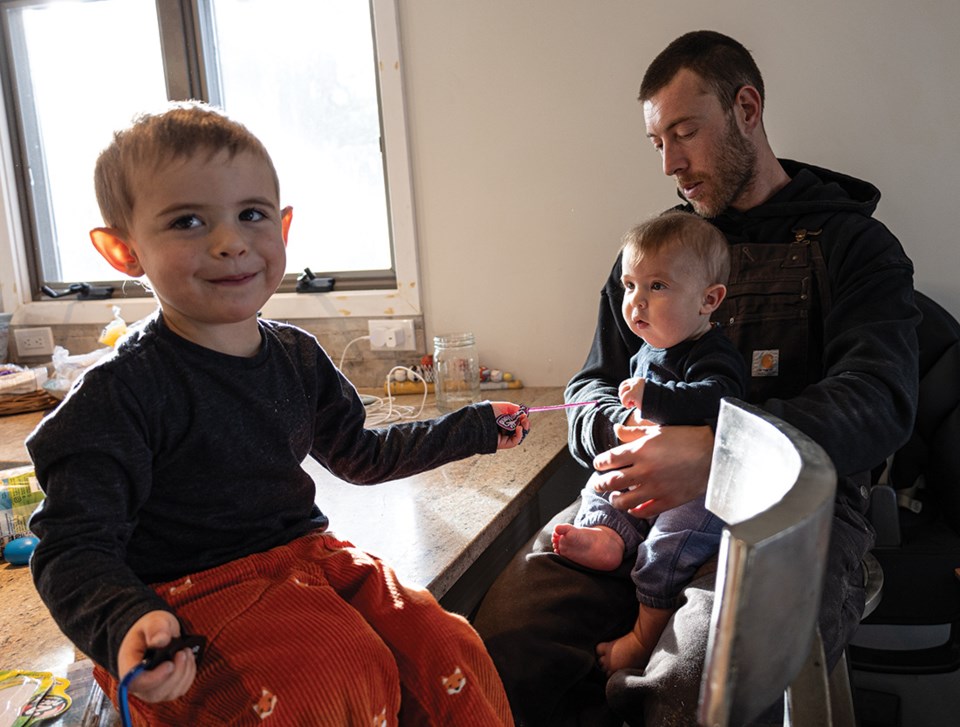They said they would come visit when the house in Ridgway was finished. They had a new grandson they wanted to meet, too. Rahm Haggai kept working on the house, building on weekends when he had time off.
Now, "I don't think they're coming," he said, shaking his head.
After eight weeks of chaos, little information and no certainty of what happened to his parents, Haggai doesn't think they're alive. The last communication anyone had from them was the morning of Oct. 7, when Judi Weinstein and Gadi Haggai were out for an early morning walk near their community, about a mile from the Gaza border.
"We're outside. Face down in a field," Weinstein texted to her family. "We see tons of rockets."
It was around 6:50 a.m. They were only 2 kilometers from home, but they never made it back.
They're still missing.
Bits of information have come to the family over the past few weeks, since his parents disappeared on the day now called Black Shabbat. There's a recording of a 911 call with Judi – in which she said her husband had been shot in the head and was unresponsive. In the same call, she reports that she's hurt, too.
There's a poor-quality image from an Israeli Army intelligence recording.
"I can tell it's my dad, being thrown onto a Hamas truck like a dead deer, on the way to Gaza. But I didn't see my mom there," he said.
Another surveillance recording showed his parents hiding from Hamas in some trees, when two terrorists on motorcycles ride toward them, shooting.
"I know my dad is dead for sure. He was shot in the head," Haggai said. A kibbutz ambulance attempted to come help them but was also ambushed, he said.
The family initially received information that the Israeli government thought their parents had been kidnapped, due to signals from their cellphones. But that doesn't seem to be true now, given the new information they received, Haggai said.
His father had left his cellphone at home. That phone signal was later detected in Gaza, indicating looters took it.
The lack of information has been frustrating. Haggai thinks about how it took nine hours for the government to show up, to help his parents and the other residents of the Israeli kibbutz who were attacked. He's angry that the government didn't take intelligence seriously, warning this attack was coming.
He keeps building the house in Ridgway and waits. His community is small – around 400 people – and he knows the victims identified from Kibbutz Nir Oz, the hostages, the people telling stories about their homes being ransacked and their families murdered. They're his classmates, his friends, his community.
Mostly, he's tried to just keep going with life.
Initially, he felt an urge to go back to Israel, but his siblings and friends there told him there wasn't anything he could do. It was mass confusion. No one knew what was going on. He was better off waiting. For the first week, he jumped awake when his phone buzzed in the night. Now, he waits to look at the messages.
They hoped to have more news when more than 100 hostages were released by Hamas during a week-long pause in fighting. But as of last weekend, there was nothing.
His parents, who he described as practical people, wouldn't want their family to be paralyzed with mourning, he said. "Don't even waste your time on a funeral for us," he thinks they would tell them. Though, his father always wanted his body donated to the University of Tel Aviv for research. He was 72 when he went missing.
"His joke was, he didn't get into university unless he was dead," Haggai said.
Haggai and his family – including his partner, Sydney Mendel, and his sons Reef and Oak, left Sunday for Israel. He hopes to learn more about what happened while he's there, and visit family.
On this two-week trip, Haggai will return to the kibbutz. He'll go to the 800- square-foot, modest concrete home where he and his three siblings grew up. The place where his parents got up early and meditated, and his 70-year-old mom wrote a haiku every day. Where they lived and dreamed of peace with Palestine.
He thinks of the others from his community who have nothing now. Their cars have been burned, their homes destroyed. Farmers living in hotels in the city now, without work, displaced from their livelihoods.
"What are they supposed to do?" he asked.
Haggai and Mendel have established an online fundraiser for the community of Kibbutz Nir Oz. Visit GoFundMe and "Survivors of Kibbutz Nir Oz by Rahm Haggai" to donate.



